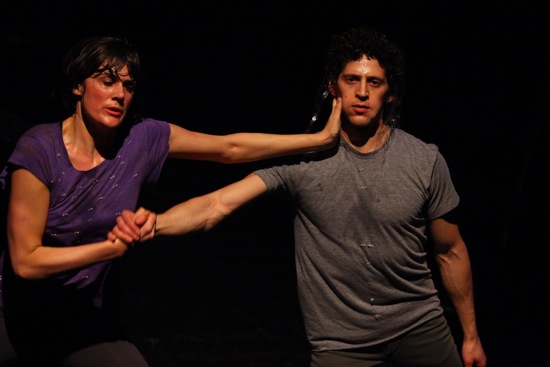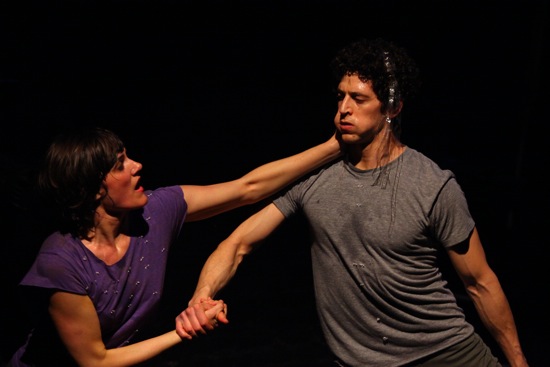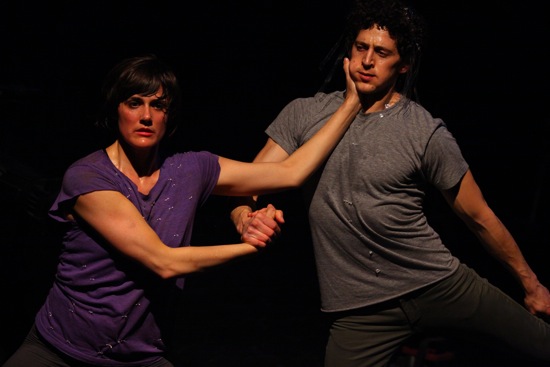You’re Me. That’s the name of Faye Driscoll’s duet for herself and Jesse Zaritt. And the chosen title is a pretty blunt way of putting out an idea that longtime couples acknowledge in more honeyed syntax—possibly with damp eyes. I hope it won’t turn you off, dear reader, if I note that this no-holds barred encounter between a man and a woman is about identity and gender roles. You’re Me tackles these pardon-the-yawn issues with such savagery and convoluted wit that an evening at the Kitchen, where the piece continues through April 21, is a bracing experience.
One thing that makes the duet so startling and, at times, moving is that Driscoll and Zaritt (who contributed material to the piece) are not playing with assurance the many roles that mates fall into with each other; they’re trying them on, never sure if this stance or that gesture is the right one, or “the real me.” A smile may begin tentatively, become absurdly broad, then wither. A pumping of the pelvis, stripper-style, may be executed so forcefully and go on for so long that it loses whatever meaning it was supposed to have.
Being a man and a woman, Driscoll and Zaritt explore all the stereotypes hanging off me-Tarzan-you-Jane, peel-me-a-grape, and love-me-or-I-die, plus all the other contradictions and variants attached to gender or societal conventions. Zaritt’s lyrical passages can look either lovely or goofy (once a bounding, androgynous Pan, another time a clichéd female). Driscoll, lumbering spraddle-legged, fists clenched, goes over the top in denoting “male,” yet also demonstrates strength without artifice.
The opening tableau symbolizes discarding another kind of artifice. When the audience enters the Kitchen’s black-box theater, Driscoll and Zaritt are displayed side by side, facing us. They’re unnaturally tall, since the long velvet panels of their fantastic attire conceal the white stools they stand on. The two are not just costumed; they’re decorated. Beads, flowers, fruit, scarves, what-all. A hank of fake hair protrudes from Zaritt’s sleeve, a white plastic bottle is stuck in Driscoll’s. They stand motionless for a long time. Beneath her straggly bangs, Driscoll looks uncomfortable and truculent; Zaritt, with his curly hair, big eyes, and noble posture, could pass for a Roman emperor having a bad-toga day.
Gradually, it becomes apparent that the two are unobtrusively shedding all the stuff hanging off them. It takes a while. Plop, there goes an orange. A necklace falls. A bouquet slips from inert fingers. Finally, they rip off what’s left, pick up the mess, pile it onto the stools, pull the stools apart, draw elastic tapes from them, and anchor the tapes together near the first row of seats to form a V on the floor. In this arena, wearing tight, stretchy pants—half jeans, half-leggings—and tee-shirts with scattered silver studs, they run through a variety of poses, sometimes in unison, sometimes not. Getting into each new position involves a lot of tiny adjustments. Gradually they stop holding the poses and begin morphing smoothly from one to another. A welter of relationships emerge, some of them extreme. The positions are often awkward, askew—attempts at defining something the performers aren’t sure about. Their faces work too—taking on slyness, anger, satisfaction, humility, etc.
Several times, they talk inaudibly to each other. They could be a couple trying to get something straight for themselves or performers working out a maneuver. For instance, Driscoll doesn’t approve of the way that her partner grabs and hugs her. Over his shoulder, her face shows us her discomfort, her need for this to be perfect. She gestures as she talks. He can’t get it right. He brings a rose from one of the stools and offers it. That cuts no ice at first. Then, finally, bliss! Some of their games edge into violence. He pretends to pull out her guts; she writhes unconvincingly.
Throughout this first part, Driscoll skillfully manipulates her material, repeating moves, adding to them, performing them with subtly different intent. Some of them look almost everyday, others are stagier, and some are wildly bizarre. Consider this. she stands with one arm stretched out to the side, an expectant look on her face. Zaritt approaches her with bulging cheeks and carefully spits out a row of “diamonds” along her arm and into her hand. Then he collects them again, she kneels, and he attempts to spit them into her open mouth. Hopeless. Finally he passes the remainder to her mouth-to-mouth. She grins and holds up her arms in triumph.
This last episode is a transition from the elegantly spare, but meaty part into the second, messier half of You’re Me. Now props make the role-playing more excessive, more maudlin, more desperate, as if aggrandizing everything and dressing it up would make it more real, but in various ways, it becomes less real. For instance, at one point the business end of a falling-apart red string mop becomes the intestines Zaritt yanks out of Driscoll, while she writhes, open-mouthed. The act is more horrible than it was earlier without the prop, but also more vehemently fake.
The pair re-arrange the tapes to indicate a square arena and take down and lay out the big white, plastic sheet that has been hanging on the back wall. Along its edges, they place assorted objects that include small dishes of paint and plastic spray bottles. He puts on a fake beard to do this and straps a belt around her. They start out fairly formally. He rotates her as if she were a ballet princess, although her balances are all askew. He spins under her arm like the woman in a ballroom competition. Recalling how he had attempted to spit jewels into her mouth; she now tries to drop grapes into his. With the same results. When Amanda K. Ringger makes sidelights turn the area into a glamorous stage, the two dancers tie up their t-shirts to expose their midriffs, drop their pants, pull down tiny, tight magenta skirts hidden under the shirts, and show off for a few seconds.
Chris Giarmo’s sound score becomes more and more present, perky tunes; men chorusing; raucous noises; heavy, rhythmic thuds; and, toward the end, sweet voices singing distantly of love. Driscoll and Zaritt seek out wilder and wilder effects, jumbling real feelings with simulacra of the same. Oranges stuffed under clothes imitate (poorly) muscular shoulders, testicles, and blobby knees. The two performers can still stand equably side by side, her lifted leg crossed over his. She holds his hand and drags a gob of sticky yellow paint across his chest and outstretched arm, continuing it along her own arm and chest. Oneness, however, doesn’t preclude their stabbing each other viciously with a trick knife. They dance tough, panting and howling, attacking and placating, cranking each other by their arms.
Running amok in this playground of the psyche, they dip their toes in paint while on the run and draw lines on each other. Grabbing the white bottles, they spray colors haphazardly on themselves. Clouds of talcum too. They pull up the plastic sheet and crawl under it. What is going on? Or more accurately, why has Driscoll made this part of You’re Me so long and so extreme that you want it to end? Perhaps she’s trying to illustrate the futility of fully understanding who you are and what you want and how another fits into that. Certainly she and Zaritt are getting crazier and more erratic, tireder and sweatier, stained with paint.
The ending redeems the marathon of self-decoration and extreme behavior. Driscoll climbs on one of the stools (now placed together downstage in the wrecked arena). Zaritt pulls item after item from inside the other stool—beads, scarves, headdresses, more—and tosses them up to her as quickly he can. She tries most of them on and immediately, almost automatically, discards them. A storm of flying fabric surrounds her. Finally Zaritt retreats to the back of the space and watches her watch us. The music dies away. Driscoll gazes at us searchingly, without pretense—still seeming to ask “what do you think of me?” Or maybe, curiously, “And you, who do you think you are?” I’ve been laughing, half-horrified for a while; now I feel more like crying. After a while, Zaritt begins to clap his hands together softly. The audience laughs, then gets it and starts to applaud. Driscoll smiles. Her own, her real smile of pleasure is beautiful.



